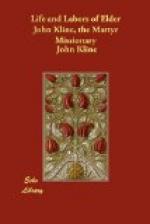We notice at once the two gates and the two ways. We also notice that these two ways or roads lead in opposite directions and to opposite destinies. These statements the simplest mind can lay hold of. Even young children know what gates are, and what roads are. They can also look in thought toward the ends of roads, and comprehend, in some measure at least, what is meant when they are told that one road ends in a great fire that will burn forever, and that the other ends in a delightful garden where flowers of beauty and fragrance, with fruits of exquisite taste and healthfulness, hang upon trees and vines of unfading loveliness.
It is never necessary to speak to the simple-minded man or child about the freedom of the human will. Their lessons in this are learned from observation and experience. By experience every one knows that he has the power to choose what he likes and to reject what he does not like. Even beasts, and birds, and reptiles do the same. They choose and appropriate the foods they like. They mate together according to the same free will, which is their love. Birds select their roosting places, and construct their nests where and how they will. “Foxes have holes;” but this is so because God first made the caverns in the rocks, and the foxes afterward chose them for their habitations. Every unit in the whole animate world, not only chooses the place of its abode, but also the modes and means of its subsistence. Even plants in a state of nature conform to this general law. Shall man, born to glorify God and enjoy him forever, be cut short in the free exercise of his will? I cannot believe it. But I do believe that the brightest saint in heaven is where he is because it was first his will to go there; and being there, it is forever his will to stay.
I am not ignorant of the arguments advanced by the other side. Many good, but, I believe misguided men, hold the opinion that man is so depraved as to his will, so lost to all sense and understanding of what is good, that he is wholly incapable of choosing the right and shunning the wrong. But I believe the Lord knows just what man can do and what man cannot do. And it is a thing self-evident to my mind that Goodness and Wisdom has never yet commanded man to do anything that is out of man’s power to do.
Let us grant that man is dead in trespasses and sins, as Paul represents him. But does not Jesus say: “My words are spirit and they are life”? The Lord’s words have LIFE in them; and if man will but hear them with his natural ear, as you now hear me speak, and then be not a forgetful hearer, but be a doer of the Word; this man shall be blessed in his deed; and soon be filled with the new life of God.




